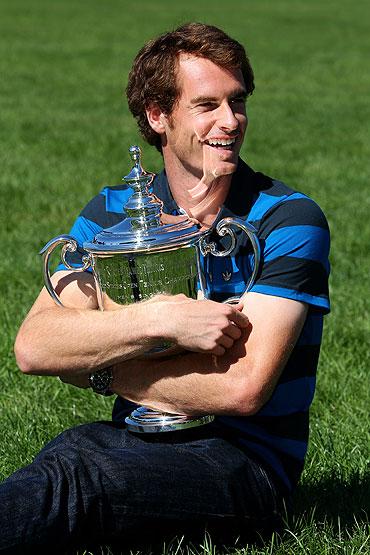
In the last eight months Ivan Lendl inculcated in Andy Murray the attributes he was known for. The Scot's back-to-back triumphs in the Olympics and US Open, says Bikash Mohapatra, is testimony to it.
Andy Murray had to make one good decision. The Scot was, till Monday, the most consistent among the current crop of players never to have won a Grand Slam title.
There was never any doubt about his talent. A versatile game and an array of shots had ensured him a haul of 23 ATP titles in a little over six years, eight of those being Master Series events -- the second most important tournaments after the majors.
The 25-year-old had been amazingly consistent since his debut and that attribute helped him to not only reach a career-high ranking of No.2 in 2009 but also be among the top four players in recent times.
However, when it came to biggest stage Murray was always found wanting. Four defeats in Grand Slam finals, and only one set (won) to show for his efforts is anything but a flattering statistic.
Add to it the fact that whenever he ventured out to play in a major there was considerable hype and a huge burden of expectations -- no Briton had won a Grand Slam since the legendary Fred Perry in 1936 -- and it was palpable that Murray was weighed down by the same.
To his credit he did not let his failures at majors affect his performances through the year. It won't be wrong to say his game peaked in the last two seasons.
The Scot reached the final of the Australian Open at the start of 2011, losing in straight sets to Novak Djokovic, and maintained good form throughout the season, reaching the last four of the other three majors and winning five tour titles, including a 17-match winning run towards the end of the year that included three straight triumphs in Bangkok, Tokyo and Shanghai.
During this phase of his career Murray had sought the services of fellow-Britons Mark Petchey and Miles MacLagan and even Brad Gilbert. These were no doubt respected names in coaching. However, when it came to their playing careers none of the above had gone close to winning a major title.
An early exit at the ATP Tour finals in London -- partly owing to injury -- helped Murray sit back, assess and decide on the future course of action. He realised he had to make a decision that would lead him to that elusive major title. The fact that it was also an Olympic year, with the Summer Games taking place in London, was also on his mind.
The Scot turned to Ivan Lendl, the legendary player who won titles galore, but, rather sadly, was best known for his failure to win on grass at Wimbledon.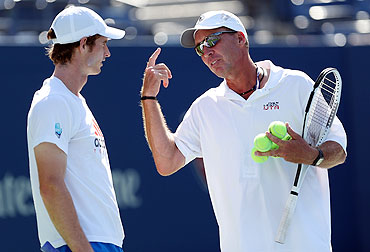
Even as the Czech-born American, who had never taken up a coaching assignment before, replied in the affirmative to Murray's request, there were many fingers raised at the latter's choice.
"Toni Nadal (Rafael Nadal's coach) never won any Slams, neither did Paul Annacone (Roger Federer's coach) or Djokovic's coach Marian Vajda," Murray pointed out while defending the decision he had made.
"He (Lendl) is also one of the most successful tennis players ever as well, so he has obviously a lot of knowledge and information that he can give me and pass on to me," he added.
The alliance didn't get off to a winning start. Murray did start the year with a title triumph in Brisbane but Lendl joined him only ahead of the year's first major. The Scot fought hard for four hours and 50 minutes during his Australian Open semi-final against Djokovic only to finish second best.
Losses in the final at Dubai (to Federer) and Miami (to Djokovic again) was followed by a forgettable clay court season and a shocking early exit at the Queen's Club, a precursor to the Wimbledon.
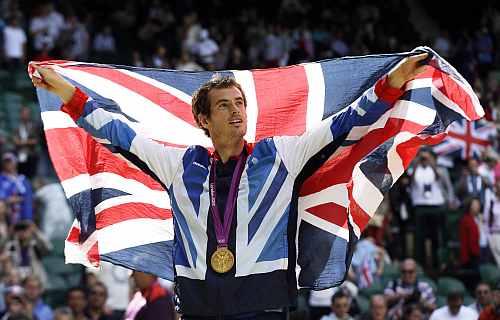
However, it was at the All England Club that the partnership peaked, the 25-year-old producing some great tennis to make his way to the final. Though he finished second best to Federer on that occasion, three weeks later he returned to face the Swiss in the final again at the same venue.
Murray scored a comprehensive win to secure the gold medal, thereby becoming the first British man to win an Olympic singles title since Josiah Ritchie in 1908. He also partnered Laura Robson in the mixed doubles and the duo picked a silver medal.
Nadal's withdrawal and Federer's surprise exit meant Djokovic and Murray were always the favourites to contest the final at the US Open. And so it happened, albeit after a bit of struggle -- particularly for the latter against Tomas Berdych.
The opening set was a struggle, the tie-break alone taking 24 minutes. Once Murray pocketed that 12-10 he had history on his side --18 of the past 20 US Open men's finals had been won by the winner of the first set.
The Scot, after a lapse of concentration, also pocketed the second set (7-5) and it seemed his drought was about to end. No player since Jack Kramer in 1946 had won the title at the Flushing Meadows having dropped the first two sets.
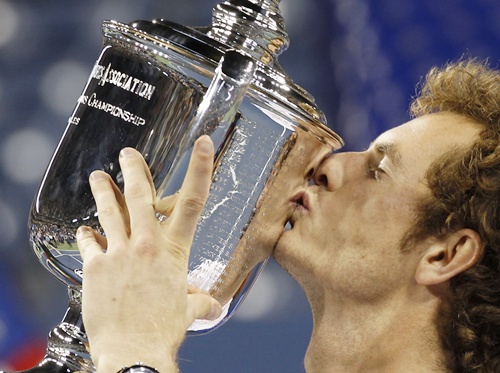
Djokovic, the defending champion, seemed likely to rewrite history as he raced through the next two sets. However, Murray controlled both his nerves and an aggressive opponent on the day.
The score line read: 7-6(10), 7-5, 2-6, 3-6, 6-2. The clock indicated 4 hrs, 54 minutes, equalling the longest US Open final in history.
And of course, Murray had won.
It took Lendl five final appearances to win his first Grand Slam title -- the French Open in 1984.
It had taken Murray an equal number of finals to secure his maiden major title.
For those keen on statistics, Lendl had won a whopping 40 titles before landing his first major. Murray achieved the same after winning 23 trophies.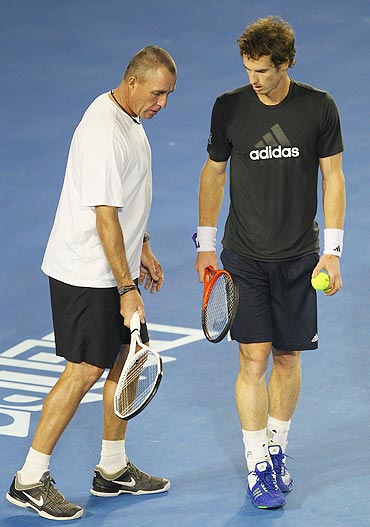
Besides the fact that he failed at Wimbledon, Lendl's was a decorated career, one that saw him winning 94 tour titles -- more than the combined effort of his two major rivals, Boris Becker (49) and Stefan Edberg (42). More importantly, he was known for his consistency, fitness, fortitude, resilience and killer instinct -- qualities that helped him have a long and illustrious career.
While there's no doubt that the Scot is more versatile as a player than the Czech-born American was during his time, what Lendl had done in the last eight months was to inculcate in his understudy the attributes he was known for.
Lendl had delivered in his maiden stint as coach, in just over eight months at that. The Scot's back-to-back triumphs in the Olympics and the US Open were testimony to the fact.
Murray had, after all, made the right decision.